Intro
Learn about flu symptoms, treatment options, and prevention methods. Identify common influenza signs, explore antiviral medications, and discover natural remedies to alleviate fever, cough, and body aches.
The flu, also known as influenza, is a highly contagious respiratory illness caused by the influenza virus. It can affect anyone, regardless of age or health status, and can lead to serious complications, especially in vulnerable populations such as the elderly, young children, and people with certain chronic health conditions. Understanding the symptoms and treatment options for the flu is essential to help prevent its spread and alleviate its severity.
The flu virus is highly contagious and can spread through the air when an infected person talks, coughs, or sneezes, releasing droplets that contain the virus. It can also spread by touching surfaces or objects that have the virus on them and then touching one's mouth, nose, or eyes. The flu season typically runs from October to May, with the peak season usually occurring between December and February. During this time, it's essential to take preventive measures, such as getting vaccinated, practicing good hygiene, and avoiding close contact with people who are sick.
The symptoms of the flu can vary from person to person, but common symptoms include fever, chills, cough, sore throat, runny or stuffy nose, muscle or body aches, headaches, fatigue, and diarrhea or vomiting. Some people may also experience a loss of appetite, sweating, or feeling weak or tired. In severe cases, the flu can lead to complications such as pneumonia, bronchitis, sinus infections, or ear infections. If you're experiencing any of these symptoms, it's essential to seek medical attention to prevent further complications.
Understanding Flu Symptoms
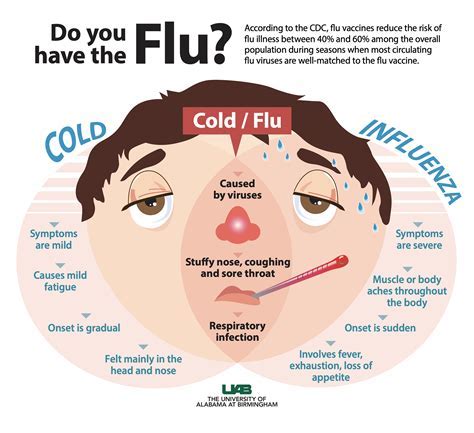
Types of Flu
There are three main types of flu viruses: A, B, and C. Type A and B viruses are responsible for the seasonal outbreaks of the flu, while type C viruses are less common and typically cause mild symptoms. The flu virus can also be classified into different subtypes based on their surface proteins, such as H1N1 or H3N2. Understanding the type of flu virus that's causing your symptoms can help your healthcare provider determine the best course of treatment.Treatment Options for the Flu
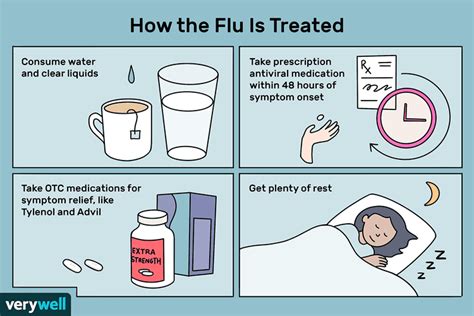
In addition to over-the-counter medications, there are also prescription medications available that can help treat the flu. Antiviral medications such as oseltamivir (Tamiflu) and zanamivir (Relenza) can help reduce the severity and duration of the flu symptoms. These medications work by inhibiting the replication of the flu virus and can help prevent complications such as pneumonia. However, they're most effective when started within 48 hours of symptom onset, so it's essential to seek medical attention as soon as possible if you're experiencing flu symptoms.
Home Remedies for the Flu
In addition to medical treatment, there are also several home remedies that can help alleviate flu symptoms. Staying hydrated by drinking plenty of fluids, such as water, soup, or electrolyte-rich beverages like sports drinks, can help thin out mucus and prevent dehydration. Resting and avoiding strenuous activities can also help your body recover from the flu. Using a humidifier to add moisture to the air can help relieve congestion and cough, while using a warm compress or taking a warm bath can help relieve body aches and headaches.Prevention and Vaccination
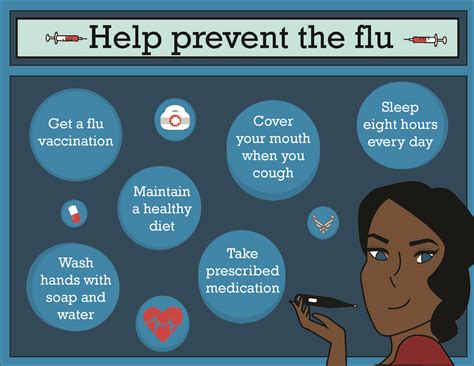
In addition to vaccination, there are also several other ways to prevent the flu. Practicing good hygiene, such as washing your hands frequently with soap and water, avoiding close contact with people who are sick, and avoiding touching your eyes, nose, and mouth, can help prevent the spread of the flu virus. Using a face mask when you're around people who are sick can also help prevent the spread of the flu.
High-Risk Groups
Certain groups of people are at higher risk of developing complications from the flu, including the elderly, young children, and people with certain chronic health conditions. These groups should take extra precautions to prevent the flu, such as getting vaccinated, practicing good hygiene, and avoiding close contact with people who are sick. If you're in a high-risk group and you're experiencing flu symptoms, it's essential to seek medical attention as soon as possible to prevent further complications.Complications of the Flu
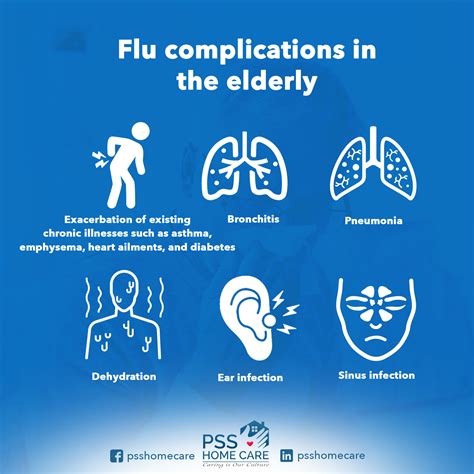
Seeking Medical Attention
If you're experiencing flu symptoms, it's essential to seek medical attention as soon as possible. Your healthcare provider can diagnose the flu based on your symptoms and medical history, and can prescribe treatment to help alleviate symptoms and prevent complications. If you're in a high-risk group, it's essential to seek medical attention immediately, as you may be at risk of developing serious complications.Flu and Other Health Conditions
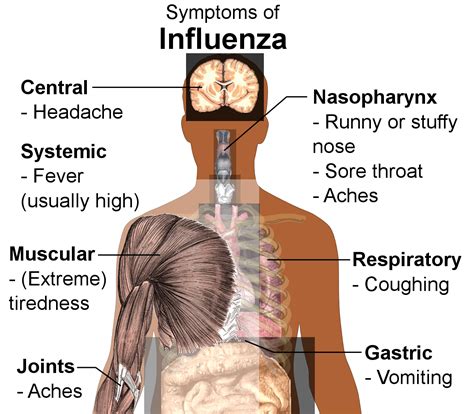
Managing Flu Symptoms with Other Health Conditions
If you have a pre-existing health condition, it's essential to manage your flu symptoms carefully. Your healthcare provider can help you develop a plan to manage your symptoms and prevent complications. This may include taking medication to alleviate symptoms, staying hydrated, and getting plenty of rest. It's also essential to monitor your condition closely and seek medical attention if your symptoms worsen or if you experience any new symptoms.Conclusion and Next Steps
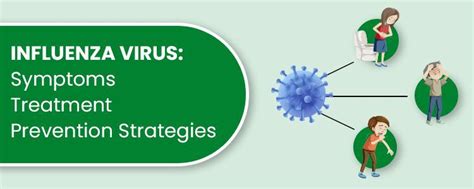
If you have any further questions or concerns about the flu, we encourage you to comment below or share this article with your friends and family. Remember, the flu is a serious illness that can have serious consequences, so it's essential to take it seriously and take steps to protect yourself and your loved ones.
What are the symptoms of the flu?
+The symptoms of the flu can vary from person to person, but common symptoms include fever, chills, cough, sore throat, runny or stuffy nose, muscle or body aches, headaches, fatigue, and diarrhea or vomiting.
How can I prevent the flu?
+The best way to prevent the flu is by getting vaccinated. You can also practice good hygiene, such as washing your hands frequently with soap and water, avoiding close contact with people who are sick, and avoiding touching your eyes, nose, and mouth.
What are the complications of the flu?
+The flu can lead to several complications, including pneumonia, bronchitis, sinus infections, and ear infections. These complications can be serious and even life-threatening, especially in high-risk groups.
How can I manage my flu symptoms if I have a pre-existing health condition?
+If you have a pre-existing health condition, it's essential to manage your flu symptoms carefully. Your healthcare provider can help you develop a plan to manage your symptoms and prevent complications. This may include taking medication to alleviate symptoms, staying hydrated, and getting plenty of rest.
When should I seek medical attention if I'm experiencing flu symptoms?
+If you're experiencing flu symptoms, it's essential to seek medical attention as soon as possible. Your healthcare provider can diagnose the flu based on your symptoms and medical history, and can prescribe treatment to help alleviate symptoms and prevent complications.
